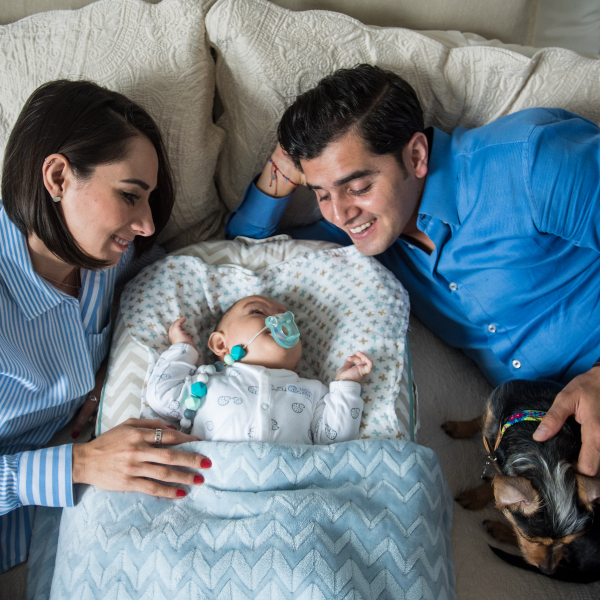
In many American households, it’s practically unthinkable not to have furry friends who are part of the family. However, when it comes time to add a new sibling of the human variety into the fold, parents are understandably anxious. Will the animal react strangely? Dislike the baby? Or even worse, bite or scratch? Here are some tips on how to introduce your animals to the new baby.
Behavior Training Starts Nine Months Early
Rather than focusing too much on baby-specific manners, it’s important to start early with behavioral training in general. If your dog knows good manners, does not jump and lick, and follows commands immediately, such as to sit, stay, lie down, or go into their designated space, it will be much easier and safer to keep them under control when that time does come to introduce them to the baby. If you are not well versed in dog training, we recommend working with a local dog trainer who specializes in the dynamics of growing families.
Change the Routine More Gradually
You want your dog to learn pleasurable associations with your new baby – not scary or uncomfortable ones. Making little changes here and there throughout your pregnancy can be helpful. For example, avoid lavishing lots of extra attention and playtime on your dog before giving birth because you feel guilty about not getting to do that later. Rather, cut back on playtime so that the dog won’t get confused and jealous when the baby arrives and playing is a thing of the past. You can also have the dog start sleeping in their new area or being walked at a different time, so that they don’t blame those things on the baby!
Teach Your Dog About Babies
Your dog is already aware that something is different. They can already hear and smell your baby. They may not be sure exactly what is going on, but they know change is happening! You can help them by showing them the baby’s things to sniff, bringing the empty stroller for walks, and setting boundaries in the nursery. And when your baby is born, someone can introduce an item with the baby’s scent to the dog before you come home. The dog should smell the item from a distance, being taught to be respectful to the baby before they even meet.
What About Cats?
Since cats are typically smaller and less excitable than dogs, they tend to be less of a worry. Oftentimes, they may be unenthusiastic or avoid the new baby. At worst, they may become aggressive, pee on everything, or hide away. Cats are very curious, so you can try letting them explore the nursery, sniff the baby’s items, and generally acclimate them to the sights, sounds, and smells that accompany a new baby. Many parents are worried about the urban legend of a cat getting into the crib and harming the baby, but cats just don’t care enough to do things like this. We recommend keeping the nursery door closed (or putting up a gate) and using a video monitor over the crib. (And of course, you probably already know not to change the litter box when you’re pregnant!)
By starting ahead of time and gradually getting your pets trained in manners and used to the idea of the new baby, you’ll be way ahead of the game by the time you actually give birth. Best case scenario, they’ll love each other and you’ll all be one big happy family!